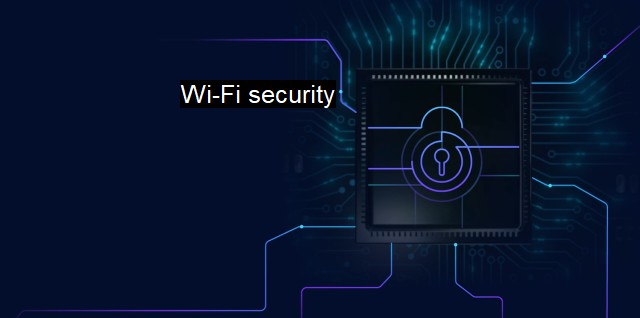What is Wi-Fi security?
Securing Your Wireless Network: The Importance of Wi-Fi Security in the Digital Age
Wi-Fi security essentially refers to the protective measures applied to prevent unauthorized access and other malicious threats to your wireless network. Wi-Fi security is paramount. It acts as your first line of defense against potential infiltrators seeking unauthorized access to your sensitive data. It's an essential component of a secure network; without it, any device or individual within range could possibly connect to your network, potentially accessing, misusing, or corrupts your data.In a world increasingly relying on digital transactions and networking, a secured Wi-Fi is no longer just an option, it’s a necessity. Whether it's for your home network, office setting, or public use like cafes and hotels, ensuring the maximum level of Wi-Fi security should always be encouraged.
Just like a chain, your cybersecurity strength is only as durable as the weakest link, which may be your Wi-Fi network if it's neglected. Your network's vulnerability might invite attackers to not only steal your bandwidth but also sensitive information. Files, personal credentials, social security numbers, corporate data, bank details are some of the many sensitive data attackers seek. Thus, cybersecurity practices include and indeed start with a fortified Wi-Fi security.
Wi-Fi networks are often secured using methods like WEP, WPA, and WPA2. WEP, the oldest standard, provides the bare minimum security - it's relatively easy for hackers to decrypt the hidden data. WPA improves this limitation but also has its vulnerabilities. WPA2 again upgraded Wi-Fi security by using a powerful encryption method known as AES, which is challenging to crack.
Quite recently, Wi-Fi Alliance, introduced a new security protocol, WPA3, presenting tougher security measures. WPA3 offers more robust password protections, prevents offline password-guessing attacks, adds encryption on public Wi-Fi networks and provides device-to-device authentication channels. Nonetheless, it doesn't carte blanche indicate that networks with outdated protocols are insecure, but updating to WPA3 will inevitably enhance security levels.
Despite these protocols, cyber attackers relentlessly evolve with technology, always discovering more sophisticated methods to penetrate your defenses. Therefore, besides having secure protocols, having a strong and unique Wi-Fi password is crucial. Frequently changing these passwords will also contribute to maintaining security.
What if malware or a virus somehow bypasses these security measures and accesses your network? That's where antivirus protection comes into play. An antivirus will scan your network and files continually for malicious software and quarantine or eliminate it before causing harm. Thereby, having an efficient antivirus enhances your Wi-Fi security as it can effectively neutralize any threat that might have penetrated your outer defenses, thus forming another integral part of your Wi-Fi security link.
There's also the option of a Virtual Private Networks (VPNs) that provide another layer of security by encrypting your online activities. VPNs give users a secure tunnel that scrambles data from their devices to the internet, thus preventing unwanted intruders from monitoring your online activities, a great tool, especially on public Wi-Fi networks.
In sum, Wi-Fi security goes beyond merely securing your network access. It has expanded to protect the integrity of your entire digital existence. It's about understanding that your private data could be subjected to unauthorized access, manipulation, and theft at any moment. Thus, it is a responsibility that comes with using Wi-Fi technology to learn and include safe practices, such as updated security protocols, strong and unique passwords, comprehensive antivirus protection, and thoughtful online activities. Any vulnerability left untreated could lead to severe and costly damage. But most of these risks can be minimized, if not eliminated completely, by taking Wi-Fi security seriously as an integral part of cybersecurity.

Wi-Fi security FAQs
What is Wi-Fi security and why is it important in cybersecurity?
Wi-Fi security refers to the measures taken to protect wireless networks from unauthorized access and cyber attacks. With the increasing use of Wi-Fi in various devices, securing the network is crucial to ensure the protection of sensitive data and prevent breaches.What are the common risks associated with Wi-Fi security?
The most common risks associated with Wi-Fi security include eavesdropping, man-in-the-middle attacks, rogue access points, and password cracking. Cybercriminals can intercept wireless signals to gain access to sensitive information, distribute malware, or launch denial-of-service attacks.What measures can be taken to improve Wi-Fi security?
To improve Wi-Fi security, you can use strong passwords and encryption, keep software and firmware updated, enable firewalls, disable unused network services, limit network access, and monitor network traffic. Additionally, you can use antivirus and anti-malware software to detect and remove any potential threats.How does antivirus software help protect Wi-Fi networks?
Antivirus software can help protect Wi-Fi networks by detecting, preventing, and removing malware and other cyber threats. It scans all incoming and outgoing traffic and alerts users of any suspicious activity, such as attempts to download viruses or Trojan horses. With antivirus software, you can ensure that your Wi-Fi network is protected from potential cyber attacks.| | A | | | B | | | C | | | D | | | E | | | F | | | G | | | H | | | I | | | J | | | K | | | L | | | M | |
| | N | | | O | | | P | | | Q | | | R | | | S | | | T | | | U | | | V | | | W | | | X | | | Y | | | Z | |
| | 1 | | | 2 | | | 3 | | | 4 | | | 7 | | | 8 | | |||||||